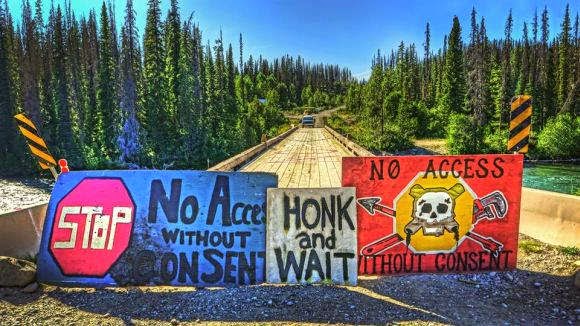From Zoe Blunt at the Vancouver Island Community Forest Action Network
Right now across North America, groups of land defenders are doing their damnedest to block tarsands oil from coming to the coasts. Big oil and the Conservative government are insisting on pipelines from Alberta to the Pacific to feed the Asian export market. But thousands of locals are pledging to put their freedom on the line to stop them.
In Burnaby BC, the front has shifted from street rallies to blocking pipeline workers from drilling through Burnaby Mountain. Hundreds of native and non-native environmentalists have joined forces to occupy a conservation area in a last-ditch effort to stop Kinder Morgan and protect the Salish Sea and the traditional territory of the Tsleil-Waututh Nation, which has launched a court challenge against the tarsands pipeline.
But now Kinder Morgan has filed its own lawsuit naming the land defenders. And on Friday Nov 14, the judge granted the pipeline company’s request for an injunction and ordered resisters to leave or face arrest.
Many are not leaving. Those who feel called to defend the coast, please join these brave people. Come to bear witness and follow your conscience. I know I can’t stand aside and allow these machines to override the will of the people and open up a wilderness park and the whole south coast to toxic oil spills.
How to join:
- Come for a day or two or a week. Bring a friend if you can.
- Be prepared to camp. Bring a tent and a sleeping bag, rain gear, food and a water bottle.
- Call Zoe to get connected to a team, and to check your gear: 250-813-3569
- Directions: 300 Centennial Way, at the east end of Hastings St in Burnaby. Take the #135 bus from Waterfront Skytrain station.
There are several groups on the mountain, from tight affinity groups to community coalitions, and they are making different plans. There may be people going in different directions, so please follow your heart, or call Zoe to connect to a network.
This is where the game gets interesting. We’re playing for high stakes, and we could see a quick reversal if our side’s challenges to Kinder Morgan are heard and upheld in court.
The Tseil-Waututh Nation is joined by 150 other First Nations, dozens of community groups, and Burnaby’s mayor and council. Support these community groups on Indiegogo.
A spill of any kind – like the Exxon Valdez oil tanker spill in Alaska in 1987 – would devastate the wild coast of British Columbia, including the Great Bear Rainforest, Haida Gwaii, salmon runs, wildlife habitat, and the livelihoods and culture of thousands of native people who depend on the sea. A pipeline blowout or a tanker collision would demolish coastal tourism. We can’t even estimate the cost.
Those who love this coast are pledged to defend it.
Come to the Solidarity House in Sooke and get skilled up
I’m happy to announce that the Solidarity House is now open for land defense training. On Sundays, starting on Nov 23, we’re offering the opportunity to support the frontlines and observe first-hand as BC moves to a new phase of land defense.
Join us to talk about strategy, solidarity, and specific skills like backcountry work, mapping, and fundraising. Lend your good energy to an inspiring grassroots movement led by incredibly resilient activists.
Call 250-813-3569 or email zoe@wildcoast.ca for the address and details.

